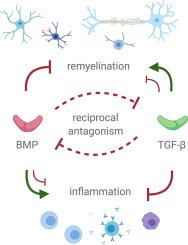当前位置:
X-MOL 学术
›
J. Neuroimmunol.
›
论文详情
Our official English website, www.x-mol.net, welcomes your
feedback! (Note: you will need to create a separate account there.)
Opposing and potentially antagonistic effects of BMP and TGF-β in multiple sclerosis: The “Yin and Yang” of neuro-immune Signaling
Journal of Neuroimmunology ( IF 2.9 ) Pub Date : 2020-10-01 , DOI: 10.1016/j.jneuroim.2020.577358 Marinos G Sotiropoulos 1 , Tanuja Chitnis 1
Journal of Neuroimmunology ( IF 2.9 ) Pub Date : 2020-10-01 , DOI: 10.1016/j.jneuroim.2020.577358 Marinos G Sotiropoulos 1 , Tanuja Chitnis 1
Affiliation

|
Bone Morphogenetic Proteins (BMP) and Transforming Growth Factor-beta (TGF-β) are cytokines with similar receptors and messengers. They are important for immune cell function, with BMPs exerting mainly proinflammatory but also anti-inflammatory effects, and TGF-β suppressing inflammation. Patients with Multiple Sclerosis exhibit BMP overactivity and suppressed TGF-β signaling. This dysregulated signaling participates in the crosstalk between infiltrating immune cells and glia, where BMP inhibits remyelination. Reciprocal antagonism between the two pathways takes place via a variety of mechanisms. Although this antagonism has not been studied in the setting of Multiple Sclerosis, it could inform further research and treatment discovery.
中文翻译:

BMP 和 TGF-β 在多发性硬化症中的对抗和潜在拮抗作用:神经免疫信号的“阴阳”
骨形态发生蛋白 (BMP) 和转化生长因子-β (TGF-β) 是具有相似受体和信使的细胞因子。它们对免疫细胞功能很重要,BMPs 主要发挥促炎作用,但也发挥抗炎作用,TGF-β 抑制炎症。多发性硬化症患者表现出 BMP 过度活跃并抑制 TGF-β 信号传导。这种失调的信号参与了浸润免疫细胞和神经胶质之间的串扰,其中 BMP 抑制了髓鞘再生。两种途径之间的相互对抗通过多种机制发生。尽管尚未在多发性硬化症的背景下研究这种拮抗作用,但它可以为进一步的研究和治疗发现提供信息。
更新日期:2020-10-01
中文翻译:

BMP 和 TGF-β 在多发性硬化症中的对抗和潜在拮抗作用:神经免疫信号的“阴阳”
骨形态发生蛋白 (BMP) 和转化生长因子-β (TGF-β) 是具有相似受体和信使的细胞因子。它们对免疫细胞功能很重要,BMPs 主要发挥促炎作用,但也发挥抗炎作用,TGF-β 抑制炎症。多发性硬化症患者表现出 BMP 过度活跃并抑制 TGF-β 信号传导。这种失调的信号参与了浸润免疫细胞和神经胶质之间的串扰,其中 BMP 抑制了髓鞘再生。两种途径之间的相互对抗通过多种机制发生。尽管尚未在多发性硬化症的背景下研究这种拮抗作用,但它可以为进一步的研究和治疗发现提供信息。











































 京公网安备 11010802027423号
京公网安备 11010802027423号